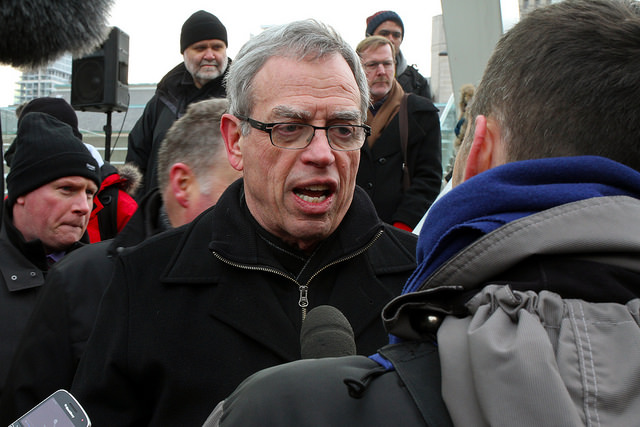Like our economic coverage? rabble is reader-supported journalism. Chip in to keep stories like these coming.
Statistics Canada is reporting a 0.3 per cent increase in monthly GDP for July, on top of a (downward revised) 0.4 per cent increase in June. This will no doubt spark Conservative politicians, and many economists, to declare that the shallow recession which Canada experienced in the first half of 2015 is already over.
As recently as last week, Finance Minister Joe Oliver was still denying the existence of the first-half recession. We can certainly debate the depth and longevity of that downturn, but there is no denying that real GDP fell for two consecutive quarters — economists’ traditional (and, until now, not very controversial) benchmark.
Prime Minister Harper brushed off the official recession as “a couple of weak months.” (In fact, monthly GDP fell in six of eight months from October through June.) But now it seems that two months of positive data is more than enough to conclusively declare the recession over — and, for Conservative politicians, more evidence that their plan is “working.”
Never mind that this is the same Conservative “plan” that contributed to Canada experiencing the only recession among major industrial economies so far this year. Claiming “victory” because GDP is growing again after a recession, is a bit like commenting on how good it feels to stop beating your head against the wall. Before popping any champagne, we’d better pause to ask: why were we beating our heads against the wall in the first place?
And while the June and July GDP numbers are positive, in my view it is too early to conclusively declare the recession over. Here are some cautionary notes:
- Seventy per cent of July’s GDP growth (and 50 per cent of June’s) was due to one sector: oil and mining. In particular, non-conventional oil production rebounded after forest fires and maintenance shutdowns cut its output in the spring. That rebound cannot be repeated.
- In non-oil sectors, the GDP numbers are decidedly more mixed. Of the 19 other two-digit sectors tracked by Statistics Canada (other than oil and mining), 9 experienced zero or negative growth in July. The June and July numbers reflect a major rebound in oil production, but they do not yet indicate an economy-wide recovery.
- Private sector payrolls shrank in the first two months of the third quarter (according to the Labour Force Survey). Total employment grew marginally, solely reflecting public sector hiring. In fact, private sector employment is still lower (as of August) than in October of last year.
- Remember, the monthly GDP by industry data uses a totally different methodology than the quarterly GDP by expenditure data — and it is the latter that determines quarterly growth rates (and hence whether or not we are in recession). In particular, the monthly numbers will not reflect the continuing decline in business capital spending which was the dominant factor behind the GDP shrinkage in the first half.
- Other macro indicators weakened during the third quarter, hardly indicating a “recovery” (including commodity prices, the loonie, the stock market, and interest rates — see chart below). Resource investment, which accounted for 30 per cent of total business capital spending before the downturn, is still shrinking — and possibly even faster than in the first half, in response to the dismal trends in commodity prices.

As I argued when the second quarter GDP numbers confirmed the recession, the big issue is not whether GDP growth is slightly positive or slightly negative. The big issue is why it has been so close to zero in the first place. The July GDP numbers do not change that analysis. And they do not change the empirical fact that the Harper government’s overall economic record — even before this year’s downturn — is uniquely weak, on both historical and international criteria.
Third quarter GDP data will not be released until December 1. That’s when the recession (yes, shallow and possibly short-lived, but a recession all the same) may or may not be relegated to the history books. And by then, the election will also be in the history books.
Jim Stanford is an economist wth Unifor.
Photo: Alex Guibord/flickr
Like our economic coverage? rabble is reader-supported journalism. Chip in to keep stories like these coming.



